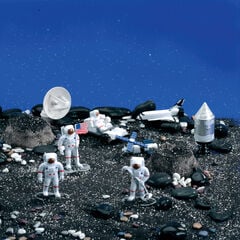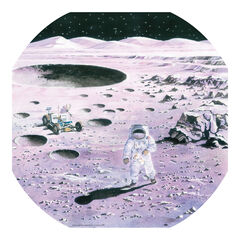National Space Day – 1st May 2020
Children will often have lots of things they would like to find out about so start by writing these down and include things you or other family members would like to learn too. It may be that learning something that a grandparent wants to know is just the motivation they need!
In this blog we have collated lots of space themed ideas for you to try at home covering a range of learning areas such as english, science, art and history. Simply choose and adapt the activities dependent on your child’s age.
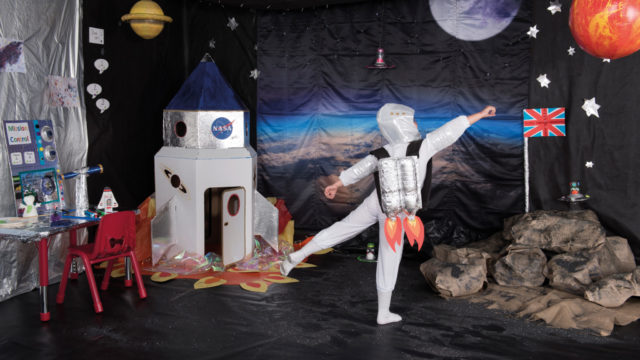
Space Stories
- Sharing books and stories
There are so many books about space and aliens. Read some that you have at home, or take a look on the internet as a lot of books are now being read aloud online. Some of my favourites are, ‘Whatever Next’ by Jill Murphy, ‘Winnie in Space’ by Valerie Thomas and Korky Paul, and ‘Man on the Moon (a day in the life of Bob)’ by Simon Bartram.
- Write your own space story
Use the books that you read or listen to as inspiration for your own space story. You could choose a story and write an alternative ending, or create a whole new space adventure. Where will you go? Who will you meet? What will happen? Plan and write a story. You can use this 5 part story structure to help:
Opening > Build-Up > Problem > Resolution > Ending
Alien Invasion
Set up an alien invasion in your living room or back garden with a crashed spaceship or toy alien. You could do this with your child or do it ‘elf on the shelf’ style while they are asleep. Use this as the starting point for lots of fun learning activities:
- Develop speaking and listening skills by asking questions and discussing where the alien came from and why you think the alien has come.
- Your alien might write a letter to your child and explain why they are here. Do they want to learn something new or do they want help with something?
- You can then write a letter back to the alien, answering his questions or completing work he has sent.
- Try writing a newspaper report about the alien invasion. Were there any eye witnesses? Look at different newspaper reports to discuss style and tone then become a journalist and report on the events. You could also plan and record a news report for the news at 6pm!
Space quiz
Since lockdown, a lot of people have been organising quizzes for friends and families over video calls. Set children the challenge to create a space quiz for your family or friends. Here are some space rounds to include:
- Space maths word problems. Create some of your own space themed word problems. Start with a calculation, e.g. 49 +12 = 61. Then come up with a word problem using this calculation, such as “There were 49 aliens sitting on Mars. 12 aliens arrived from Saturn. How many aliens were there altogether?”
- Which planet am I? Research facts about the different planets and give three clues before people must guess. For example “I am the hottest planet in the solar system. I am the second brightest natural object in the sky. I am the closest planet to Earth. Which planet am I?”
- Picture round. Draw pictures or create 3D models of different planets. Show your images and ask people to guess the planet.
- Music round. Research different space themed songs, play the music intro and your players must guess the music.
- Space Trivia – Research interesting facts and set up a trivia round. You could do a true/false round and change some of the facts slightly, such as “The first man on the moon was Neil Armstrong in 1965. True or False?” False … it was 1969.
- Create your own quiz theme tune – Try to create your own solar system song to open and close your quiz. Why not create musical instruments to accompany your song, or create a ‘pots and pans’ band.
Go on your own space mission
Plan and go on your own space mission with some of these ideas:
- Design your own rocket and make it using junk modelling materials (cardboard boxes, tubes, plastic pots). Encourage the design stage first so that children can consider the materials they use and draw a design. Try to add some extra challenge by providing design criteria, such as, it must be big enough for a toy/you to fit in. Reading a story such as ‘Whatever Next by Jill Murphy’ is a great stimulus.
- Write instructions about how to make a rocket for space travel. These could be for your own rocket you have made, or research real rockets.
- Add some counting in to your space adventure by counting things on your space ship or counting aliens/comets that you travel past.
- When you arrive, write a postcard back home from the planet you land one. What do you see? What do you hear?
- Create a space travel soundtrack on your journey by experimenting with your voice to create lots of different alien noises.
- You could learn a space themed song to sing on the journey, such as ‘Five Little Men in a Flying Saucer’. Look online for a video or soundtrack.
- When you return from your space mission, write a story or recount of your adventure.
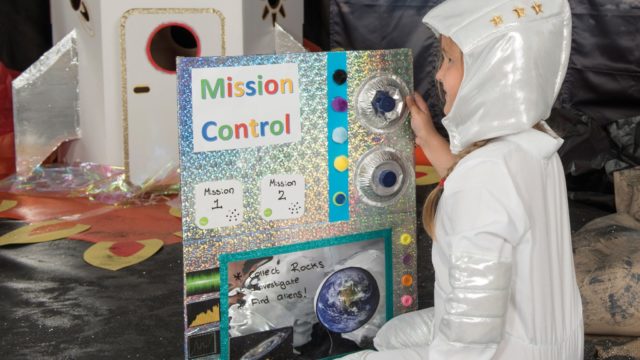
Historical Space Missions
Research and learn about historical space missions such as Apollo 11, with Neil Armstrong being the first man to land on the moon.
- Write a newspaper report about the first moon landing. Include pictures by dressing up and taking photos or pretend to be a news reporter and interview people as ‘eye witnesses’ to the event. You could also use film and create a news programme or record a mini documentary.
Creative Space
There are lots of creative craft projects you can do linked to space.
- Chalk Drawings. Use black paper and chalks to create a space drawing. Think about the colours you use, smudging the chalk for shooting stars or maybe add a space rocket.
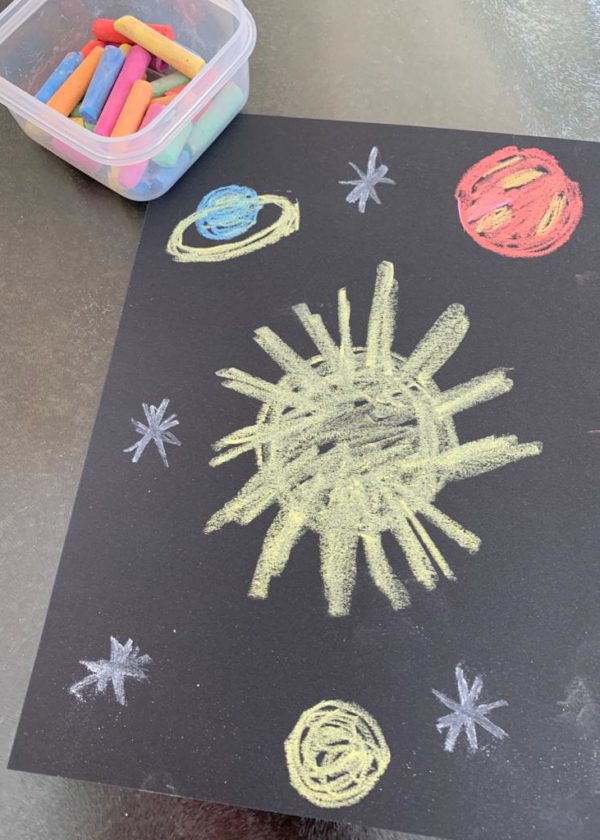
- Create 3D Planets using papier-mache. Inflate balloons to different sizes to represent the planets. Create a papier mache mixture. You could use 1 cup of flour to 1 cup of water, or white liquid glue and water (just enough water to make it a bit less sticky). Dip strips of paper (newspaper if possible) into the glue and cover the balloons with a few layers. They don’t have to be smooth as planets are textured! Let them dry until they are hard and then paint and decorate to make them into planets.
- Create spelling rockets. Try spelling out your name, or spellings you are finding tricky to remember. There are lots of opportunities to learn letter names and letter sounds when making these rockets.
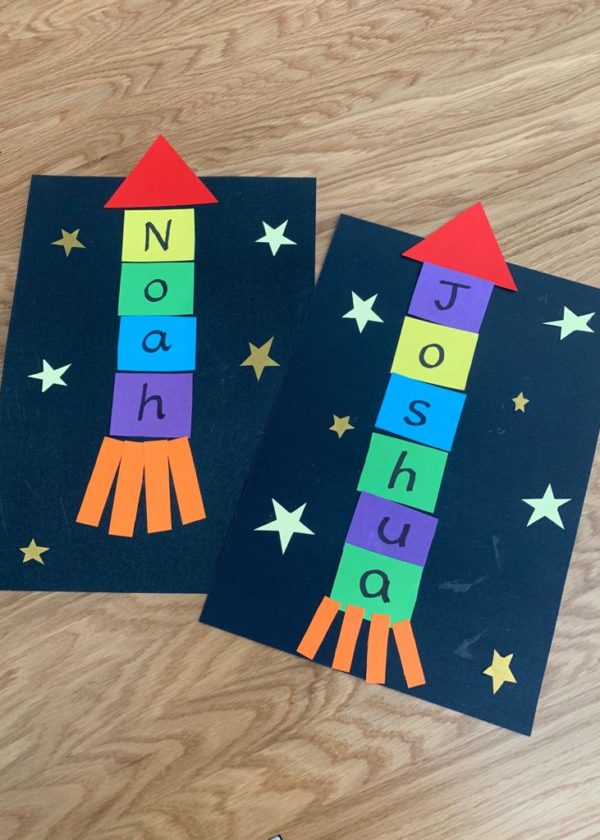
- Make an Alien Space Ship. First paint or cover a paper plate with silver foil. Then create an alien figure. You could use pompoms, pipe cleaners and wiggly eyes. Stick the alien in the centre of the paper plate and place a clear cup over the top, securing with plenty of glue. Finish by personalising with a variety of collage materials.

Space Science
- There are several apps that you can download and track the movement of the International Space Station (ISS). You could see when it is flying overhead, watch recorded footage from inside and outside the ISS and see which continents and oceans it passes over.
- Movements in space. There are some great videos online that explain how the planets and sun move and orbit each other. Watch some and then try to recreate this using people, for example, one person can be the sun and another the Earth.
- Balloon rocket experiment. Start by cutting a piece of string about 10-15 feet long. Tie one end of the string to a chair, door handle or other support. Thread the string through a straw, pull the string tight and tie the other end to another support (I used a kitchen chair and door handle). Blow up a balloon and hold the neck closed, don’t tie it. Keep holding the balloon and tape the balloon to the straw. Push the balloon to one end of the string (with the open end facing the support). Let go and see your rocket balloon fly! You could set up two strings to have a balloon rocket race.
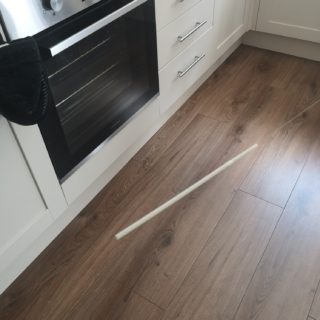
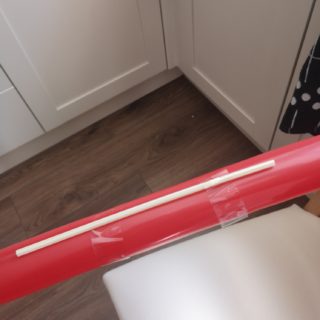
Here are 5 facts about SPACE to get you started …
- Space is completely silent.
- Mercury and Venus are the only 2 planets in our Solar System that have no moons.
- The hottest planet in our Solar System is Venus.
- One million Earths could fit inside the sun!
- There are more stars in the universe than grains of sand on all the beaches on Earth.
Can you find more?


